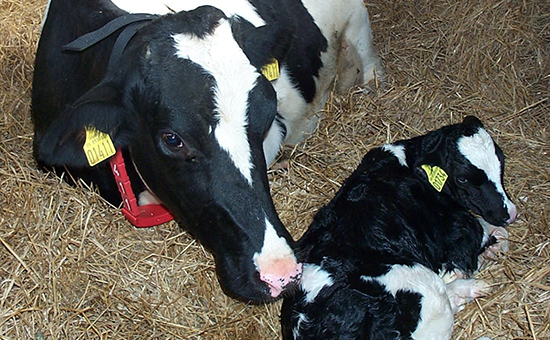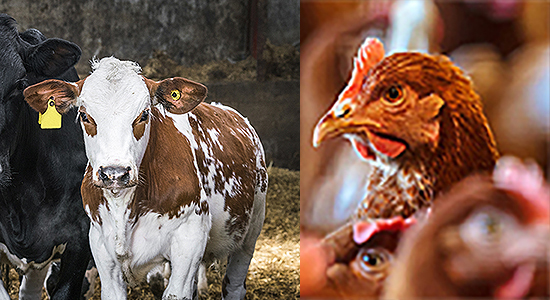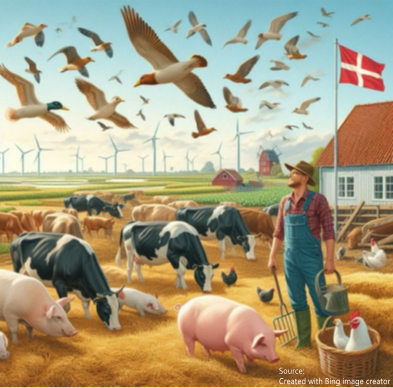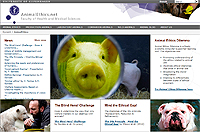Animal Health and Welfare
(Production, Nutrition and Health PNH)
The goal of this section is to conduct research related to veterinary science within the fields of bioethics, animal behaviour and epidemiology. The research focuses on identifying and describing patterns, associations and relationships, and using this knowledge to improve animal welfare, sustainability and profitability within animal production.
The subjects of animal welfare, prudent use of antibiotics, sustainable production systems and profitability for farmers are the core of the research in this group. This creates value for society in general because it develops and evaluates novel ways of optimizing animal welfare and profitability at both the farm and national level, including prioritising the prudent use of antibiotics.
Studies in animal behaviour and bioethics provide a foundation of basic knowledge, to create a better understanding of the interaction between people and animals.
Studies of disease spread and the effectiveness of control measures help farmers, vets and other people in the field to reduce spread of diseases. Moreover, all of the mentioned disciplines are combined in the One Health approach, improving the sustainability of co-existence for humans and animals at the same time.
RESEARCH GROUPS:
- Animal Genetics & Breeding (Professor Merete Fredholm)
- Animal Welfare and Animal-Human Relations (Professor Björn Forkman)
- Epidemiology and Disease Control (Professor Søren Saxmose Nielsen)
- Infectious Disease Epidemiology & Animal Health Economics (Professor Beate Conrady)
- One Health & Sustainability (Professor Liza Rosenbaum Nielsen)
- Book on evaluation of One Health initiatives: https://www.wageningenacademic.com/doi/book/10.3920/978-90-8686-875-9. One Health combines the disciplines of animal and human health and ecosystems. This is a handbook that provides an overview of concepts and processes as well as guidance on how to implement the One Health approach.
- Lahrmann, H. P., Hansen, C. F., D’Eath, R., Busch, M. E., & Forkman, B. (2018). Tail posture predicts tail biting outbreaks at pen level in weaner pigs. Applied Animal Behaviour Science, 200, 29–35. https://doi.org/10.1016/j.applanim.2017.12.006. This study shows that lowered tail postures in pigs can be utilized to predict tail biting outbreaks at pen level.
- Sandøe, P., Corr, S. A., Lund, T. B., & Forkman, B. (2019). Aggregating animal welfare indicators – Can it be done in a transparent and ethically robust way. Animal Welfare 28(1): 67-76. Serious challenges arise within the process of creating an index for animal welfare. In this study, we focus on the ethical aspects of this problem and discuss the different ways to proceed.
This section contributes knowledge, articles, and results within its core areas to the website Dyreetik.dk.
Dyreetik.dk is a web site run by the Faculty of Health at the University of Copenhagen. The person responsible for the site is Peter Sandøe, professor of animal ethics.
An English version of Dyreetik.dk is found at AnimalEthics.ku.dk. The aim of the site is to share insights and reflections regarding animal ethics and animal welfare. It contains academic papers and other academic publications which as far as possible are made available in an open access format. Furthermore it contains introductory texts aimed primarily at students, professionals and university teachers from veterinary and animal science and other branches of biology.
The section’s areas of expertise are
Bioethics:
- Veterinary ethics and science theory
- Science theory for students of the production animal sciences
- Responsible Conduct of Research (mandatory PhD course)
Ethology
- Ethology
- Forensic medicine and welfare evaluation
- Applied ethology
Veterinary epidemiology
We teach methods for investigating causes of the distribution of diseases, as well as methods and tools for combating diseases in populations. This includes the following courses:
- Basic statistics and epidemiology
- Epidemiology I: Planning a study
- Epidemiology II: Analyzing continuous, count and dichotomous data from observational studies
- Epidemiology III: Analysis of clustered data – with emphasis on veterinary- and animal science applications
- Diagnostic Test Evaluations
- Ad hoc courses
Interdisciplinary and applied areas
- Animals, humans and society
- Health and Welfare
- Equine nutrition and management
- Master of Veterinary Public Health: Risk Analysis of Animal Health and Food Safety
- Herd- and Societal Health
- Differentiation: Heart diseases
- Differentiation: Biomedicine
- Differentiation: Diseases in Family Animals
- Differentiation: Production animals
- Veterinary Forensic Medicine
- Master of Veterinary Public Health: Disease Outbreak Management
- Master of Veterinary Public Health: Disease Control and Dynamics - in a One Health Setting
- Master of Veterinary Public Health: Animal Health Economics
Project: Robuste kalve

The aim is to promote the breeding of robust calves by producing knowledge and tools for optimal health management of calves, with a focus on the first months of life, so that calf mortality and antibiotics-
consumption can be lowered.
Read more about "Robuste kalve" (in Danish)
Project: ACROBAT

Reduced use of AntimiCROBials in cAttle and poulTry. Read more about the ACROBAT project
Epi-Flu: Preparedness tools for avian influenza in cattle

The aim is to develop an effective preparedness tool to manage Avian Influenza outbreaks in the Danish cattle population.
Read more about Epi-Flu here

Head of Section
Professor Hans Houe
Mail: houe@sund.ku.dk
Phone: +45 353-33585
Address:
Grønnegårdsvej 8
DK-1870 Frederiksberg C
Group/project members
| Name | Title | Phone | |
|---|---|---|---|
| Agger, Jens Frederik Gramstrup | Teaching Associate Professor | +4535333013 | |
| Alsted, Nadja | PhD Fellow | +4535325687 | |
| Alves Neves, Andre Luis | Associate Professor | +4535331580 | |
| Apenteng, Ofosuhene Okofrobour | Assistant Professor | +4535325466 | |
| Baranski, Ilona Ewa | Laboratory Technician Trainee | +4535324971 | |
| Bjerg, Bjarne Schmidt | Associate Professor | +4535333586 | |
| Bjerrum, Anders | Senior Consultant | +4535324654 | |
| Boklund, Anette Ella | Associate Professor | +4535330847 | |
| Bouquet, Alban Etienne René | Teacher | ||
| Brichet, Nathalia | Associate Professor | +4535337814 | |
| Bruun, Camilla Vibeke Sichlau | Associate Professor | +4535333067 | |
| Buschard, Karsten Stig | Guest Researcher | ||
| Bødker, René | Senior Researcher | +4535325262 | |
| Cabrera I Cortada, Júlia | PhD Fellow | +4535336134 | |
| Carapeto, Sandra Filipa Oliveira | PhD Fellow | +4535335385 | |
| Chang, You | Postdoc | +4535331956 | |
| Christensen, Emma Melchior H | External, Ph.d Student | +4535321310 | |
| Christiansen, Mette Bakhaj | Laboratory Technician | +4535331961 | |
| Christiansen, Anni | Laboratory Technician | +4535330760 | |
| Christiansen, Stine B. | Senior Consultant | +4535333075 | |
| Cirera, Susanna | Associate Professor | +4535333050 | |
| Conrady, Beate | Professor | +4535322309 | |
| Czycholl, Irena | Professor | +4535329677 | |
| Denwood, Matt | Professor | +4535332307 | |
| Dhakal, Rajan | Industrial Postdoc | +4535332584 | |
| Dimopoulou, Chrysoula | Postdoc | +4535327413 | |
| Dyre, Røsle Elisabeth | Student Assistant | ||
| Eriksson, Kari Bækgaard | Research Assistant | +4535327185 | |
| Faalmaleki, Mahdi | Postdoc | +4535327611 | |
| Farra, Dima | PhD Fellow | +4535325222 | |
| Farre, Anders Michael | No job title VIP | +4535327220 | |
| Favaro, Lorenzo | PhD Student | +4535327399 | |
| Fisher, Ayoe Daubjerg | Student Assistant | ||
| Forkman, Björn | Professor | +4535333581 | |
| Fredholm, Merete | Professor | +4535333074 | |
| Glavind, Anne-Sofie | External, Ph.d Student | +4535337997 | |
| Graversen, Katrine Bækby | Assistant Professor | +4535337746 | |
| Groot, Kees | External, Ph.d Student | +4535331795 | |
| Guldbrandtsen, Bernt | Visitor | +4535334784 | |
| Gussmann, Maya Katrin | Special Consultant | +4535337510 | |
| Hald, Tine Marianne | Guest Researcher | ||
| Hansen, Marie-Louise Elisabeth L | Postdoc | +4535337265 | |
| Heiselberg, Pia Rudolph | PhD Fellow | +4535337529 | |
| Houe, Hans | Professor | +4535333014 | |
| Ibragimov, Emil | Postdoc | +4535332440 | |
| Jacquerot, Therese Hoffmann | Research Assistant | ||
| Jakobsen, Nadia | PhD Fellow | +4535327123 | |
| Jakobsen, Minna | Laboratory Technician | +4528756961 | |
| Janss, Lucas Lodewijk Gustave | Teacher | ||
| Jensen, Sarah Falck | Research Assistant | +4535323726 | |
| Jensen, Helene Ane | PhD Fellow | ||
| Jensen, Rasmus Bovbjerg | Part-time Lecturer | ||
| Jensen, Dan Børge | Associate Professor | +4535333021 | |
| Jensen, Sara Kjeldgård | Attendant FU | +4535325045 | |
| Jensen, Janne Schjødt | Academic Research Staff | +4535337745 | |
| Jørgensen, Claus Bøttcher | Associate Professor | +4535333064 | |
| Karlskov-Mortensen, Peter | Associate Professor | +4535333430 | |
| Kiesbuy, Jasmin Jensen | Student Assistant | ||
| Kirkeby, Carsten Thure | Senior Researcher | +4535337215 | |
| Kjær, Lene Jung | Associate Professor | +4535337290 | |
| Knudsen, Sofie Hougård | Student FU | +4535333554 | |
| Korzen, Selma Beck | Student Assistant | ||
| Krarup, Christina | Research Assistant | +4535337730 | |
| Kristensen, Saphira Rosalia Mia S | Academic Research Staff | +4535326629 | |
| Kristensen, Anders Ringgaard | Professor | +4535333091 | |
| Kristensen, Jeanette | Research Assistant | +4535334415 | |
| Kruse, Amanda Brinch | Assistant Professor | +4535332870 | |
| Krömker, Volker | Visiting Professor | +4535322291 | |
| Ladewig, Jan | Professor Emeritus | ||
| Larsen, Inge | Associate Professor | +4593509552 | |
| Larsen, Christina | Assistant Professor | +4535335594 | |
| Lastein, Dorte Bay | Teaching Associate Professor | +4535332732 | |
| Li, Yanqi | Guest Researcher | +4535331099 | |
| Liu, Huiming | Visiting Student | ||
| Liu, Yangfan | Postdoc | +4535323023 | |
| Luigi, Maria | Postdoc | +4535323354 | |
| Lyderik, Kimmie Kyed | PhD Fellow | +4535335092 | |
| Lyhne, Mille Kronborg | External, Ph.d Student | +4522421295 | |
| Løvendahl, Peter | Visiting Teacher | ||
| Lützen, Annika Thorup | Teacher´s Assistant | ||
| Madsen, Mogens | Special Consultant | +4535324338 | |
| Madsen, Johannes Gulmann | Associate Professor | +4535331040 | |
| Mahler, Tina Bahrt Neergaard | Laboratory Technician. | +4528756961 | |
| Mandel Briefer, Roi | Assistant Professor | ||
| Markvardsen, Mathilde Bender | Research Assistant | ||
| Mendes Galante Merca, Carolina | Research Assistant | +4535325515 | |
| Meyer, Iben | Guest Researcher | ||
| Michelsen, Anne Marie | Academic Research Staff | +4535322475 | |
| Morsing, Malene Kjelin | Assistant Professor | +4535325375 | |
| Møller, Camilla Brøndahl | Attendant FU | +4535327881 | |
| Nauta, Maarten Johannes | Visiting Teacher | ||
| Neale, Emma Marie | Student Assistant | ||
| Nielsen, Jens Peter | Professor | +4535333583 | |
| Nielsen, Liza Rosenbaum | Professor | +4535333015 | |
| Nielsen, Søren Saxmose | Professor | +4535333096 | |
| Nielsen, Camilla Kirketerp | Assistant Professor | +4527143148 | |
| Nørgaard, Peder | Teaching Associate Professor | +4535333033 | |
| Oakman, Jeanne Talchow | Research Group Secretary | +4535333585 | |
| Offersen, Simone Margaard | Guest Researcher | +4535334432 | |
| Olsen, Abbey | Assistant Professor - Tenure Track | +4535335675 | |
| Otten, Nina Dam | Associate Professor | +4535331520 | |
| Pedersen, Ken Steen | Professor | +4530576336 | |
| Pedersen, Anni Øyan | Associate Professor | +4535332097 | |
| Pellot, Lila Marie | Visiting Student | ||
| Petersen, Mette Marcher | Teacher´s Assistant | ||
| Petersen, Louise Hedegaard | Teacher´s Assistant | ||
| Pfeiffer, Moritz Alexander | PhD Fellow | +4535330024 | |
| Pinheiro Marques, Ana Rita | Assistant Professor | +4535323361 | |
| Proschowsky, Helle Friis | Associate Professor | +4535327895 | |
| Rasmussen, Philip | Assistant Professor | +4535329423 | |
| Rasmussen, Sofie Kaas | Visiting Student | +4535324082 | |
| Rauer, Carl-Emil Risum | Student Assistant | +4535336211 | |
| Rebbe, Dorte | Teacher, external | ||
| Reimert, Mossa Merhi | Postdoc | +4535324135 | |
| Ribeiro Pereira, Luiz Gustavo | Associate Professor | +4535331254 | |
| Rosendal, Rikke | Student Assistant | +4535321364 | |
| Rosengren, Laura Bjerre | Student Assistant | +4535333508 | |
| Rydal, Martin Peter | Postdoc | +4535326111 | |
| Sandøe, Peter | Head of Section | +4535333059 | |
| Skarbye, Alice Puk | Postdoc | +4535337680 | |
| Skovlund, Cecilie Ravn | Postdoc | +4520270506 | |
| Spiegelhauer, Malene Roed | Research Assistant | +4535324693 | |
| Stege, Helle | Associate Professor | +4535332836 | |
| Stelder, Jonno Jorn | External | ||
| Strathe, Anja Varmløse | Associate Professor | +4535320670 | |
| Sun, Jiahong | PhD Student | ||
| Svennesen, Line | Assistant Professor | +4535337728 | |
| Syhler, Rasmus Jelle | Animal Keeper | +4535327373 | |
| Sørensen, Anna Skytte | Student Assistant | ||
| Tajonar García, Karen Lizeth | Guest Researcher | +4535324795 | |
| Tauson, Anne-Helene | Guest Researcher | +4535333039 | |
| Thornval, Natasia Rebekka | Visiting Student | ||
| Troldborg, Nicoline Sisse | Teacher´s Assistant | ||
| Vestergaard, Marie Vibeke | Visiting Student | ||
| Woudstra, Svenja | Assistant Professor | +4535332405 | |
| Yoo, Caitlin | Visiting Student | ||
| Zenker, Friederike | Guest Researcher | +4535336008 | |
| de Knegt, Leonardo Victor | Associate Professor | +4535324062 | |
| von Rühden, Caroline Ignatz | Teacher´s Assistant | ||
| Ørbæk, Lotte | Laboratory Technician | +4535320311 |


